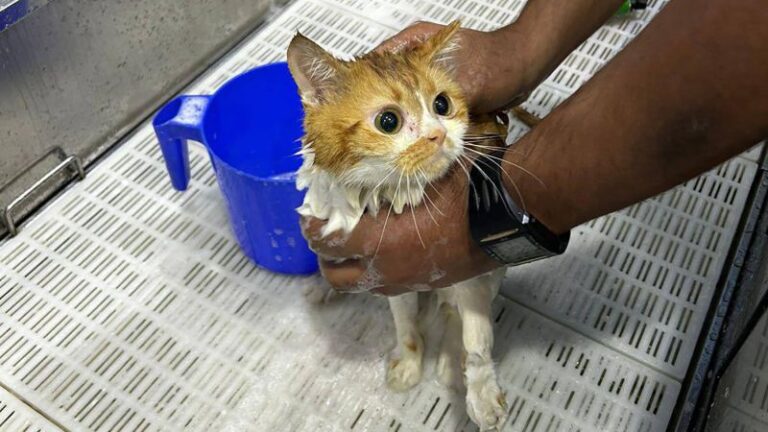Editor’s Note: A version of this story appears in CNN’s Meanwhile in the Middle East newsletter, a three-times-a-week look inside the region’s biggest stories. Sign up here.
Abu Dhabi, UAE
CNN
—
A group of United Arab Emirates residents has found more than 140 cats dumped in a desert lot in the capital Abu Dhabi, in a phenomenon that has drawn criticism from international animal rights organizations and prompted a government investigation.
Cats of all breeds, including non-native varieties like Persians, were left to die trapped in their carriers or have been wandering the desert without food, shelter or water, according to Chiku Shergill, an Abu Dhabi resident who took part in the rescue.
The animals were abandoned across the highway from the government-run Abu Dhabi Animal Shelter in al Falah, a residential area in Abu Dhabi. The shelter told CNN it was unaware of the incident and refused to comment further.
Rescuers have counted 50 dead cats in the lot and have saved 95 since September 28. A golden retriever dog was also saved, and a husky was found dead. Some of the animals had been microchipped, suggesting that they weren’t strays.
September temperatures reach a high of 40.5C (105F) in Abu Dhabi city. Desert temperatures could be higher during the day. The episode has drawn criticism from international animal rights organizations and activists.
The animal rights organization People for the Ethical Treatment of Animals (PETA) is offering a $5,000 reward for information on “whoever dumped these cats in the desert,” PETA Asia Vice-President Jason Baker told CNN in a statement.
“This act of cruelty must not be swept under the rug … The solution to the homeless-animal crisis is spaying and neutering and adopting from overworked and understaffed shelters, which PETA Asia has been asking the UAE to require for years,” Baker said.
Abu Dhabi’s Department of Municipalities and Transport (DMT) said on Wednesday that it would investigate the incident. It encouraged the public to report details on the incident and is taking measures to find those responsible for it.
Dr. Katherine Polak, Humane Society International vice president of companion animals told CNN she was pleased to see the authorities taking the matter seriously.
The volunteer rescue team is working around the clock, with many taking time off work, to continue saving the abandoned cats, getting them microchipped and finding them homes, according to Shergill.
Ten pet cats from Dubai, an hour’s drive from Abu Dhabi, were identified by microchips and returned to their homes.
Abu Dhabi initiated a Trap-Neuter-Return (TNR) program in 2008 to control feral and stray cats, primarily through the Abu Dhabi Animal Shelter.
The TNR program says it is in accordance with “international animal welfare guidelines” and claims to release the animals back where they were trapped.
“Dumping sites” for animals are widespread across Abu Dhabi and Dubai, and this was not an isolated incident, the International Organization for Animal Protection (OIPA) said in a statement, adding that it has been campaigning on behalf of stray animals in the UAE for years.



